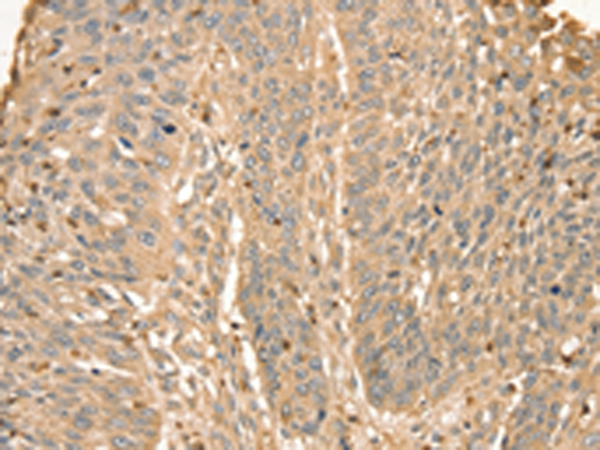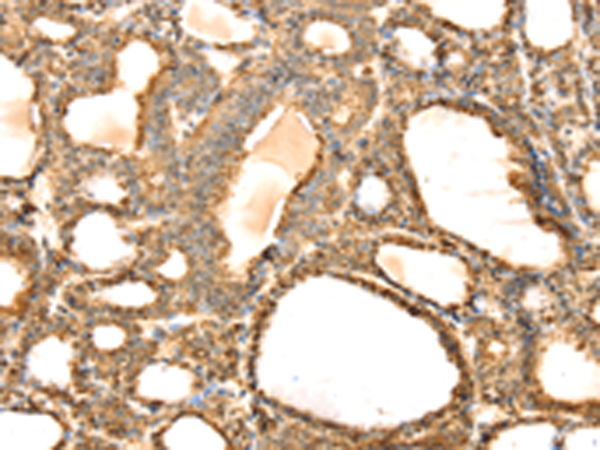

| WB | 咨询技术 | Human,Mouse,Rat |
| IF | 咨询技术 | Human,Mouse,Rat |
| IHC | 1/25-1/100 | Human,Mouse,Rat |
| ICC | 技术咨询 | Human,Mouse,Rat |
| FCM | 咨询技术 | Human,Mouse,Rat |
| Elisa | 1/2000-1/5000 | Human,Mouse,Rat |
| Aliases | p6; CAGC; CGRP; MRP6; CAAF1; MRP-6; ENRAGE |
| Host/Isotype | Rabbit IgG |
| Antibody Type | Primary antibody |
| Storage | Store at 4°C short term. Aliquot and store at -20°C long term. Avoid freeze/thaw cycles. |
| Species Reactivity | Human |
| Immunogen | Fusion protein of human S100A12 |
| Formulation | Purified antibody in PBS with 0.05% sodium azide and 50% glycerol. |
+ +
以下是关于S100A12抗体的3篇参考文献的简要信息:
---
1. **文献名称**:*S100A12 as a biomarker of inflammation in inflammatory bowel disease*
**作者**:Foell D, et al.
**摘要**:研究通过ELISA和免疫组化技术,利用S100A12特异性抗体检测炎症性肠病(IBD)患者血清和组织中的表达水平,发现S100A12显著升高,提示其可作为肠道炎症活动的非侵入性生物标志物。
---
2. **文献名称**:*S100A12 and the anti-S100A12 antibody in atherosclerosis: A potential therapeutic target*
**作者**:Morrow DA, et al.
**摘要**:该研究开发了针对S100A12的单克隆抗体,并验证其在动脉粥样硬化模型中的抑制作用。结果显示抗体能减少斑块炎症反应,为心血管疾病的免疫治疗提供新思路。
---
3. **文献名称**:*S100A12 antibody-based detection of proinflammatory activity in juvenile idiopathic arthritis*
**作者**:Frosch M, et al.
**摘要**:研究利用抗S100A12抗体分析幼年特发性关节炎(JIA)患者的滑液和血清,发现S100A12水平与疾病活动度正相关,支持其在风湿性疾病中的诊断和监测价值。
---
如需更详细的文献信息(期刊、年份等),建议通过PubMed或学术数据库进一步检索。
The S100A12 antibody is a crucial tool for studying the S100A12 protein, a member of the S100 calcium-binding protein family. S100A12. also known as calgranulin C or EN-RAGE, is encoded by the S100A12 gene and primarily expressed in granulocytes, monocytes, and certain epithelial cells. It functions as a damage-associated molecular pattern (DAMP) molecule, playing roles in inflammation, immune response, and cell differentiation by binding to calcium and interacting with receptors like the receptor for advanced glycation end products (RAGE). Dysregulated S100A12 expression is linked to chronic inflammatory diseases (e.g., inflammatory bowel disease, rheumatoid arthritis), infections, and cancers, making it a biomarker for disease activity and therapeutic targeting.
S100A12 antibodies are designed to detect and quantify this protein in research and diagnostic settings. They are widely used in techniques such as Western blotting, immunohistochemistry (IHC), and enzyme-linked immunosorbent assays (ELISA) to study S100A12's expression patterns, cellular localization, and involvement in pathological processes. Monoclonal antibodies offer high specificity, while polyclonal antibodies may detect multiple epitopes, enhancing sensitivity. Commercially available S100A12 antibodies aid in elucidating its role in inflammation-mediated tissue damage and its potential as a therapeutic target. Inhibiting S100A12-RAGE signaling, for instance, has shown promise in reducing inflammatory responses in preclinical models. These antibodies also support clinical research, enabling the correlation of S100A12 levels with disease severity, thereby guiding diagnosis and treatment strategies.
×